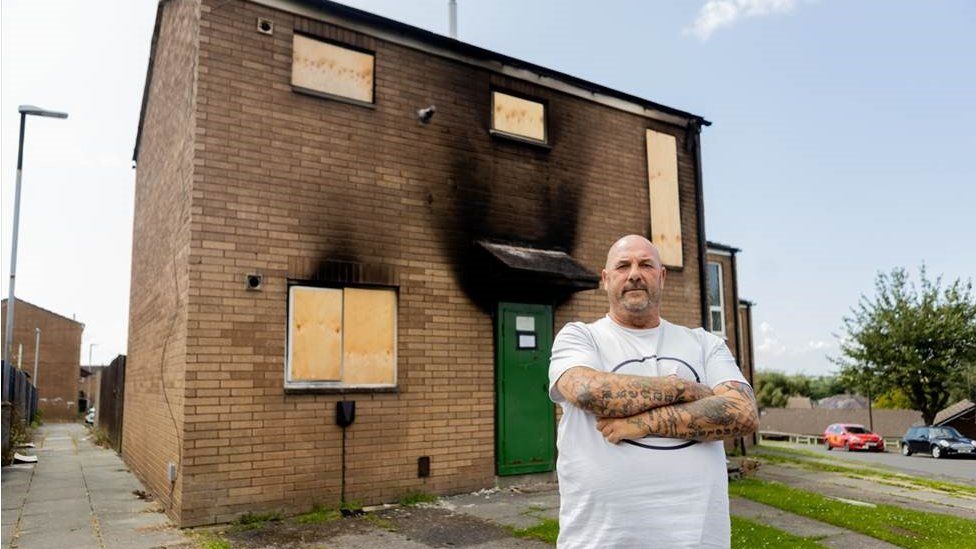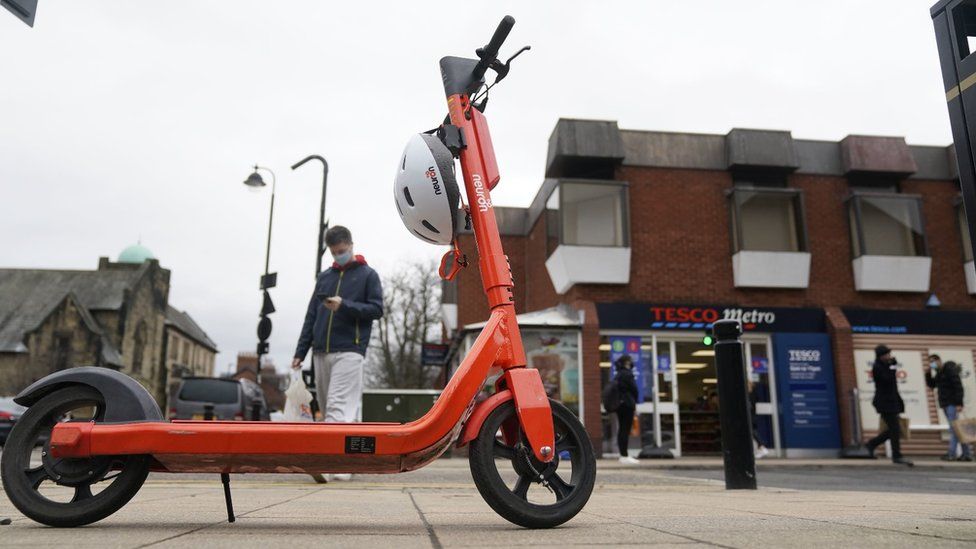E-bike battery fires spark call to regulate like fireworks
This video can not be played
To play this video you need to enable JavaScript in your browser.
Batteries for e-bikes should be as tightly regulated as fireworks, heavy machinery or medical devices because of the fire-risk they pose, a charity has said.
In June, a woman and two children died in a fire linked to an e-bike battery.
Currently, manufacturers can self-declare that e-bike and e-scooter batteries meet safety standards.
But campaigners Electrical Safety First says these batteries should instead need third-party approval before sale.
Cambridgeshire Fire Service said the bike was the “most probable cause” of the fatal blaze in June, and it is investigating the e-bike that was left charging in the flat.
Meanwhile, the London Fire Brigade said it has been called to a fire caused by these batteries once every two days on average in 2023.
“The huge amount of energy that is released over time when a battery bursts into flames is unlike other fires,” said Electrical Safety First chief executive Lesley Rudd.
A room could be destroyed “in a matter of minutes” she said.
“This unique type of fire requires special measures to tackle the increasing problem.”
The UK should adopt regulation similar to rules introduced in New York City in March 2023, Ms Rudd believes.
The US city has signed into law legislation which requires e-bikes, e-scooters and their batteries to meet standards set by a third party with expertise in battery technology.
“We need to get on top of this issue now to prevent more lives being lost,” said Ms Rudd.
“There are too many reckless operators in this space, such as third-party sellers on online marketplaces, who are risking the lives of the public and giving responsible manufacturers of these products a bad name.”
‘Incredibly ferocious’
According to the London Fire Brigade website, e-bike and e-scooter batteries “can start incredibly ferocious fires” if they get damaged or fail.
“Lithium battery fires can spread quickly out of control, and within minutes have started a large fire,” it says.
Lancaster-based Andrew Beaton said his family are facing “upwards of £50,000 in damages” after an e-bike fire destroyed their home.
“If it wasn’t for my son, we wouldn’t be here,” he said.
“He was up to get a drink at night and shouted to us after seeing the e-bike on fire – I sprinted downstairs, swung open the front door and threw the bike outside.
“In that moment, all the batteries fell out and were exploding like hand grenades.”
Despite removing the e-bike from the house, he said the fire had already spread to the stairs.
“I urge anyone thinking of buying these e-bikes not to – it’s not worth your life,” he said.

Neil Odin, prevention lead for the National Fire Chiefs Council (NFCC) said there has been a “worrying increase” in fires involved lithium iron batteries used by e-bikes.
“These are particularly concerning when they occur in people’s homes with the incorrect charging or use of items such as e-bikes or e-scooters,” he said.
“More awareness of the risks is required with a very close look at the standards associated with these products.”
The NFCC recommends that people do not charge their device’s battery while they are sleeping. It also says:
- Always unplug your charger once it has finished charging
- Plug the cable into a main socket rather than an extension lead
- Do not cover the battery with anything while charging
- Make sure you use the battery recommended by the manufacturer
- Always use the manufacturer-approved charger for the product
- Ensure you have working smoke alarms on every floor of your home and in the room where you charge the bike/scooter
Neil Odin told the BBC that fire services across the country had seen a “worrying increase in incidents involving lithium ion batteries” including involving e-bikes and e-scooters.
“More awareness of the risks is required with a very close look at the standards associated with these products”, he said.
What can be done?
Aside from regulating the sale of the batteries themselves, Electrical Safety First said e-bikes could be made safer if regulation required the battery to be positioned differently, so it was more shielded from damage.
It said the current location of batteries on e-bikes – typically under the foot plate – can expose them to damage from the ground as well as water. A mandatory increase to the height of the foot plate by 15 centimetres would minimise impact damage.
In a wide-ranging report published today, the charity also recommends:
- Banning universal chargers altogether, as this is a cause of overcharging – which can cause fires
- Introducing a standard for so-called conversion kits – which can be used to turn regular bikes into e-bikes
- Requiring the Home Office to report e-bike and e-scooter fires
- A nationwide campaign on e-bike and e-scooter safety, backed by the government, to include how to charge devices safely
- And regulating online marketplaces, where it says “many substandard and dangerous e-bike and e-scooters are purchased”, to require them to prevent or remove unsafe products
The UK Bicycle Association (BA), the trade association representing the UK cycle industry, responding to news of the report said it would “fully support” regulation.
“The BA particularly welcomes the comments around regulation of online marketplaces, which have been identified by fire services as the route by which many problematic products are sourced,” it said.
The trade body said it looked forward to discussing with ESF proposals for regulations.
James Metcalfe founder of e-bike firm Volt told the BBC that the internet was awash with substandard batteries and that “consumers need to be educated that cheap imported batteries can be extremely dangerous”.
He said said firms like Volt already had robust quality standards and said the firm welcomed any measures that will better protect the consumer.
The BBC has approached the government for comment.




